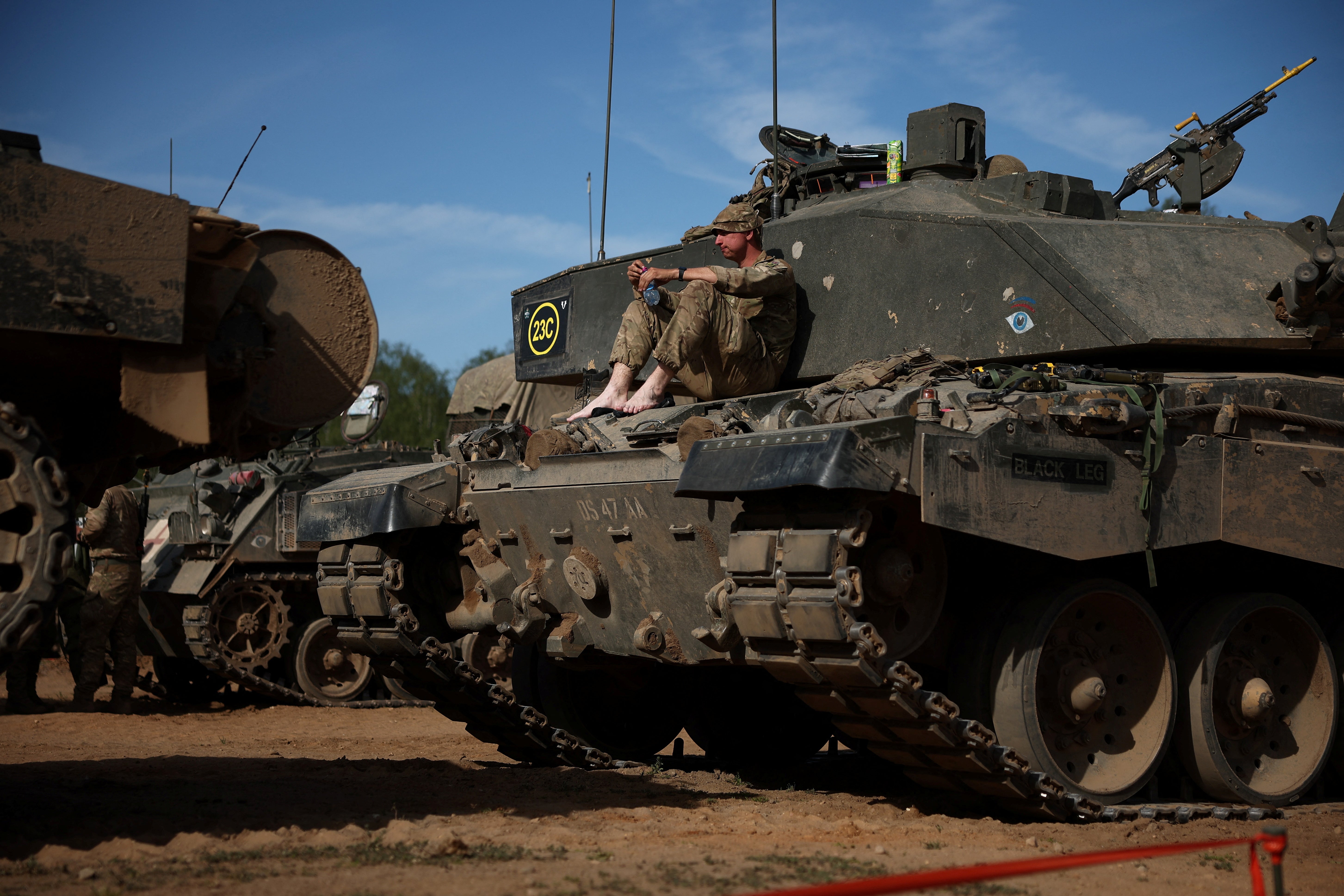Sir Keir Starmer has revealed the largest increase in defence spending since the Cold War in his military plan amid warnings the UK faces a “new era of threat”.
The government announced today that it will implement all 62 recommendations of the new and long-awaited 130-page strategic defence review.
The prime minister said: “When we set the terms of reference for this review, we set it on the premise that we will be spending 2.5 per cent of GDP on our defence. Obviously, since then, what we’ve done is then put the date on that – 2027-2028 – the highest sustained increase in defence spending since the Cold War.”
In a statement to the Commons, defence secretary John Healey pledged to “create a British Army that is 10 times more lethal”, while artificial intelligence, drones and a £1 billion investment in homeland missile defence are also all part of the new measures.
Mr Healey warned a “new era” for UK defence is needed as “the threats we face are now more serious and less predictable than at any time since the end of the Cold War”.
Speaking in Glasgow earlier, Sir Keir said the UK is moving towards “war-fighting readiness” after the review concluded that the nation should be ready for war in Europe or the Atlantic.
Starmer vows to make Britain ‘battle-ready’ — but row over funding threatens to derail plans
That’s fighting talk, prime minister – but can you deliver?
Starmer’s strategic defence review looks promising – until you read the small print
I’m a former submariner – here’s what you need to know about Britain’s new nuclear fleet
Key Points
- ‘New era of threat demands new era of UK defence,' Healey says
- Ministers to create an Army that is ‘10 times more lethal’
- Starmer moving UK to 'war-fighting readiness'
- UK to build up to 12 new attack submarines and invest £15bn in warheads
- PM fails to set date for 3% defence spending target
- Britain must be ready to fight in Europe or Atlantic, review says
A cruise missile is 'only 90 minutes away from UK', warns review's author
21:30 , Tara CobhamThe British people must recognise that a cruise missile is “only 90 minutes away from the UK”, one of the authors of the Strategic Defence Review has warned.
General Sir Richard Barrons told Sky News’s Politics Hub: “We should absolutely be prepared to exist in a world where things like precision missiles can range the UK and do great harm.
“That’s not to say it’s about to happen or imminent, but in terms of the capability, a cruise missile is only 90 minutes away from the UK.”
Earlier, he had suggested that “the damage done to places like Kyiv by missiles and air attack” could be replicated in British cities “if we don’t take steps to deter them”.
Government challenged over where money for defence spending is coming from
21:00 , Tara CobhamA former shadow defence secretary asked how the government would be able to afford the 12 new attack submarines, and whether money would have to come from budget cuts elsewhere.
Conservative MP Sir Bernard Jenkin said he was concerned the treasury would not financially back the plans set out in the Strategic Defence Review.
He said: “The document says this will allow us to grow our nuclear powered attack submarine fleet to up to 12. Isn’t the truth, and let’s speak the truth, that this is the ask to the treasury.
“The spending review is yet to decide what the defence programme will actually be. I hear what he says when he says with his full force and sincerity that, quote ‘we will fund this defence review’, but how is he going to achieve that without very much more significant cuts in other budgets because this government and no government can afford to spend much more and borrow much more if anything at all.
“So how is he going to get the cuts through necessary to fund this big increase in defence spending beyond 3.5 per cent because we all know we’re going to need more than that.”
Defence secretary John Healey said: “This is an investment that we’re making now in the production capacity, so that we can build at a faster rate, we can have a double production line in Barrow, that will allow us to build new subs to meet the number of subs we’ll need in the future to deter the threats that we’ll face, meet our Nato commitments and I’m glad that he welcomes it.”
Full story: Starmer vows to make Britain ‘battle-ready’ — but row over funding threatens to derail plans
20:30 , Tara CobhamKeir Starmer's bold defence plans have been overshadowed by a row over money as he was warned Britain may not be moving quickly enough to counter the rapidly growing threats from Russia.
The prime minister vowed to make Britain "a battle-ready, armour-clad nation” as he unveiled his strategic defence review (SDR) at the Govan shipbuilding yard in Scotland, which included a “more lethal” Army boosted to 100,000 personnel, 12 new submarines, drones and a rollout of Artificial Intelligence.
Defence secretary John Healey said: “ We are in a new era of threat, which demands a new era for UK defence.”
The Independent’s politics team has the full story:

PM vows to make Britain ‘battle-ready’ — but funding row threatens to derail plans
Tory MP claims Nato chief says spending 3% of GDP on defence is not enough
20:00 , Tara CobhamConservative MP and former soldier Stuart Anderson (South Shropshire) said Nato chief Mark Rutte had said spending 3 per cent of GDP on defence would not be enough.
Mr Anderson said he had been part of a parliamentary delegation to visit a Nato event in Dayton, Ohio, last week where Mr Rutte said 3.5 per cent was required.
Mr Anderson said: “Last week I was in Dayton, Ohio, on the Nato parliamentary assembly where the secretary-general of Nato, Mark Rutte, said 3 per cent will not be a credible solution to defence. He’s going to set this out in the Nato summit and that 3.5 per cent was required to be credible, with 1.5 per cent on defence-related funding that is going to be set out this month.
“Will the defence secretary, if this is what Nato say is a credible commitment, commit to 3.5 per cent?”
Defence secretary John Healey said: “Those are discussions for the Nato summit later this month. We go into that Nato summit having made a record commitment to invest and increase defence spending to a level in two years’ time that we’ve not seen in this country since 2010, and an aim in the next Parliament to get to 3 per cent.”
Government vows to spend what's needed to deliver defence review
19:30 , Tara CobhamThe government “will spend what is needed to deliver this review”, defence secretary John Healey has said.
Former Conservative Party leader Sir Iain Duncan Smith told the Commons: “When he said on Saturday there is ‘no doubt’ the UK defence spending will rise by 3 per cent by 2034, I nodded in approval and thought, ‘great, they’ve got a commitment’.
“By Sunday, that appears not to be the case.”
He added: “Russia, China, North Korea and Iran are all seen as threats inside this, so will he now please get to the despatch box as the character that he is and say, ‘to achieve this, we will need at least 3 per cent if not more and this government will be committed to spending it?'”
Mr Healey replied: “Look, don’t take it from me at the despatch box the afternoon, take it from the prime minister (Sir Keir Starmer) when he said we will spend what is needed to deliver this review.”
Conservative former chancellor Sir Jeremy Hunt had earlier asked: “What is the difference between the chancellor’s (Rachel Reeves’s) black hole and the defence secretary accepting 62 recommendations from the SDR (strategic defence review) without committing the funds to pay for them?”
Mr Healey replied: “Because the prime minister and the government have committed the funds, we’ve committed the funds, we’ve built them into the terms of reference that allow this SDR over the next 10 years and beyond to be delivered.”
Cleverly accuses government of being 'timid' in response to defence review
19:00Conservative former foreign secretary Sir James Cleverly has accused the government of being “timid” in its response to the strategic defence review (SDR).
In the Commons, Sir James said “fundamentally, it seems to be heading in the right direction” and added: “But why so timid? Why so slow?
“If, as (Mr Healey) says, we are facing an era-defining moment, then why not move with the pace that that era demands? Why not commit to 3 per cent in a meaningful timescale to give industry and the forces some serious opportunity to plan and make this a document that is worth its name, rather than just a ‘let’s see how little we can get away with to keep the papers happy’?”
Defence secretary John Healey replied that he would “reject that characterisation completely”.
Sir James heckled “timid” and “look forwards not backwards” from his seat as Mr Healey continued: “It is a complete break from what the government that he was a leading member of less than a year ago was presiding over – 14 years hollowing out and underfunding our armed forces and ended now.
“A defence with no vision for the future. That’s ended now.”
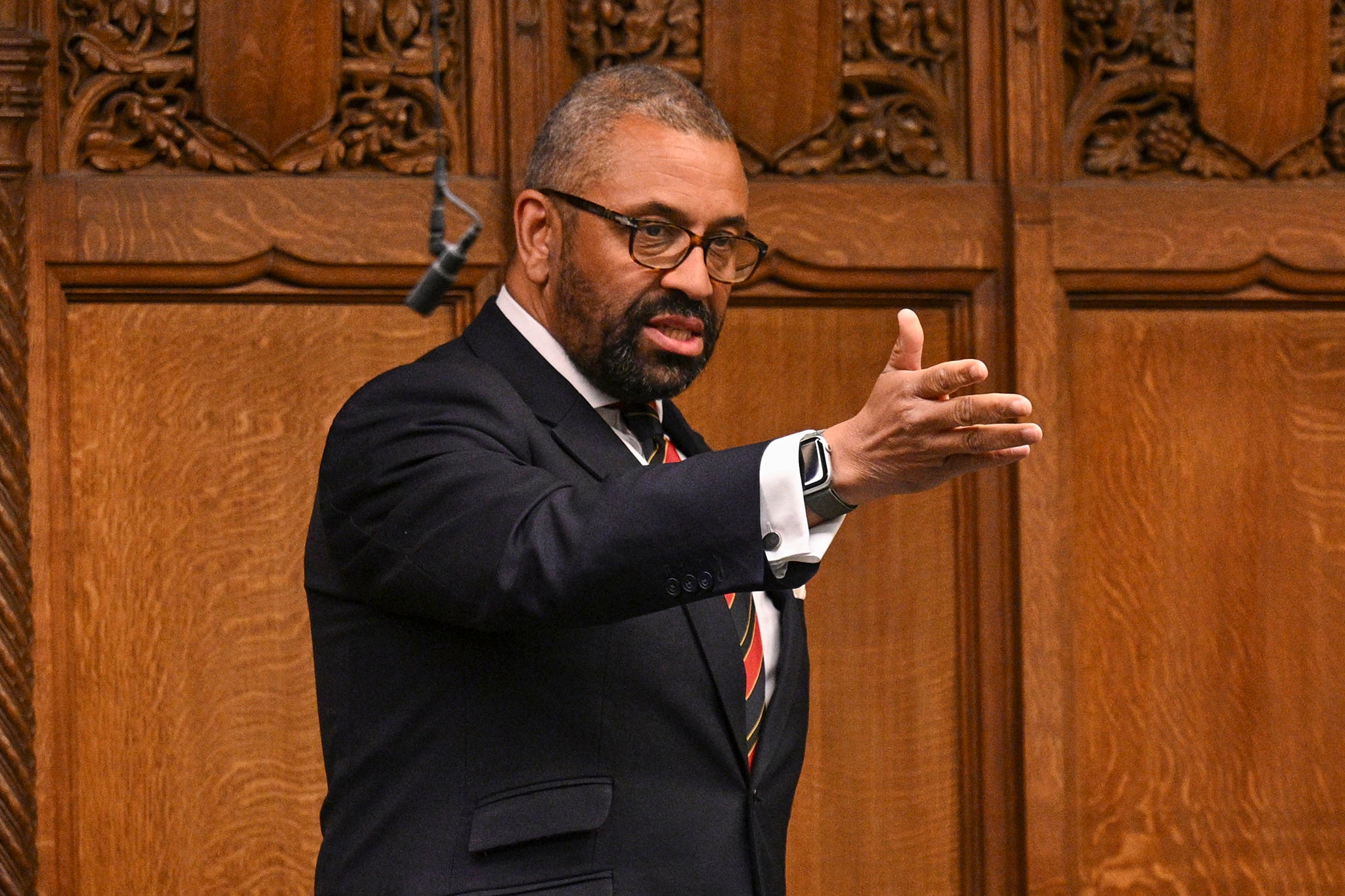
Defence secretary has 'no doubt' defence spending will increase to 3% by next parliament
18:15The defence secretary has said he has “no doubt” that defence spending will increase to 3 per cent by next parliament.
John Healey, replying to the Conservatives, told the Commons: “I see the way the world is changing, I see the way the Chancellor is fixing the economic foundations after 14 years of failure under the Conservative government and I have to say to the House that I have no doubt that we will meet our ambition to hit 3 per cent of spending on defence in the next Parliament.
“It is something that the prime minister this morning reinforced. He said that the SDR can be delivered because our commitment to 2.5 per cent was built in to the terms of reference and he said this morning we’re committed to spending what we need to deliver this review.”
There has been a 'total unravelling' of strategic defence review, Cartlidge says
18:04 , Tara CobhamShadow defence secretary James Cartlidge said there has been a “total unravelling” of the strategic defence review, telling MPs: “They haven’t got a plan to fund it.
“An SDR without the funding is an empty wish list. The ships and submarines it talks of are a fantasy fleet. The reviewers were clear in the Telegraph today that the commitment to 3 per cent, and I quote, established the affordability of the plan.
“On Thursday, the defence secretary said in an interview with The Times that reaching 3 per cent was a certainty. But by the weekend he had completely backtracked to 3 per cent to being just an ambition. And today the prime minister was unable to give a date by when 3 per cent would be reached. Why? Because the treasury hasn’t approved a plan to pay for it.”
Mr Cartlidge added: “For the treasury to approve a plan, it will have to feature billions of pounds of cuts to existing MoD (Ministry of Defence) programmes and so this SDR has dodged the big decisions on existing capabilities.
“Can the secretary of state confirm that the so-called defence investment plan, to be published in the autumn, will set out the cuts needed for the treasury to agree a plan to get to 3 per cent, details we should have had today in the SDR.”
Mr Cartlidge went on: “The secretary of state says he wants to send a strong message to Moscow, but the messages he’s sending are profoundly weak.”
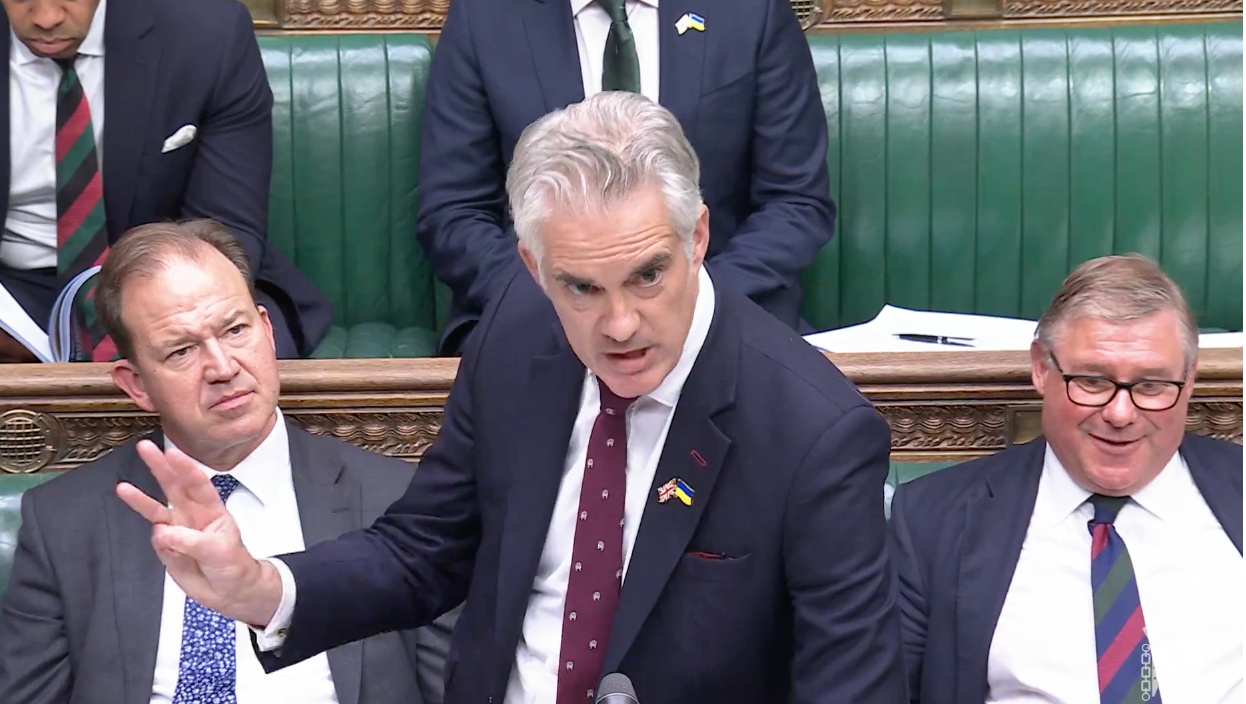
Healey insists Chagos Islands deal is a 'great investment'
17:52 , Tara CobhamJohn Healey has insisted the Chagos Islands deal is a “great investment” as he was challenged over it in the Commons.
The defence secretary also accused the Conservative Party of being “on the wrong side” of the debate.
Strategic defence review marks end to era of 'hollowing out' armed forces, Healey pledges
17:44 , Tara CobhamThe strategic defence review will mark an end to an era of “hollowing out” of the armed forces, MPs were told.
Rounding off his statement to the Commons, defence secretary John Healey said: “This SDR is the first defence review in a generation for growth and for transformation in UK defence.
“It will end 14 years of hollowing out in our armed forces, and instead we will see investment increased, the navy expanded, the army grown, the air force upgraded, war fighting readiness restored, Nato strengthened, the nuclear deterrent guaranteed, advance technology developed and jobs, jobs created in every nation and region of this country.
“The Strategic Defence Review will make Britain safer, more secure at home, and stronger abroad.”
Government aims to be first in a generation to see number of soldiers increase
17:42 , Tara CobhamThe government is aiming to be the first in a “generation” to see the number of soldiers in the British Army to increase, John Healey said.
The Defence Secretary said there would be a renewed focus on recruitment to stop the long-term decline in numbers.
Mr Healey said: “For too long our army has been asked to do more with less. We inherited a long-run recruitment crisis, 14 Tory years of cuts to full-time troops.
“Reversing this decline will take time, but we are acting to stem the loss now and aiming to increase the British Army to at least 76,000 full time soldiers in the next Parliament.
“For the first time in a generation, we are a Government who want the number of regular soldiers to rise.”
Watch: British Army will be ‘ten times more lethal’ by adopting AI technology, defence secretary says
17:37 , Tara CobhamEquipment and new technology ‘will win’ future conflicts
17:37 , Tara CobhamThe Independent’s Whitehall Editor Kate Devlin reports:
In the foreword to the review, the defence secretary John Healey writes: "Whoever gets new technology into the hands of their Armed Forces the quickest will win
Ministers have already announced plans for up to six new munition factories, up to 12 new nuclear attack submarines, £15bn of investment in the nuclear warhead programme, 7,000 UK-built long range weapons.
At the weekend Mr Healey appeared to confirm he wants to purchase fighter jets capable of firing tactical nuclear weapons, a major step up which would signal the UK recognised the world had entered a more dangerous era.
The report also calls for greater use of AI as well as a new ‘Digital Warfighter Group’ which is recommends should not be held back by constraints on how much it can pay its staff, calling for “appropriate recruitment and pay freedoms”.
The SDSR also says at least ten per cent of the MOD equipment procurement budget should be spent on new technologies every year.
It urges ministers to remove red tape and other barriers to collaboration with industry partners.
UK must ‘move to war fighting readiness’
17:26 , Tara CobhamThe Independent’s Whitehall Editor Kate Devlin reports:
One of the themes of the defence review is to make Britain war-ready.
This includes protecting critical infrastructure in the event of a crisis.
The SDSR calls for a new Defence Readiness Bill – which would give ministers powers to “respond effectively” in the event of an escalating conflict.
Already ministers have announced they will respond to the call for “always on munitions” by building up to six factories.

Defence review backs spending 3 per cent of GDP on defence
17:23 , Tara CobhamThe Independent’s Whitehall Editor Kate Devlin reports:
The review praises as “good news” the government’s “ambition” to spend 3 per cent of GDP on defence “if economic and fiscal conditions allow”.
But the report’s authors do add: “However, as we live in such turbulent times it may be necessary to go faster”.
It is understood that the report, and, crucially its recommendations, were written with the assumption that ministers would meet the 3 per cent target by the stated date of 2034
Starmer told to increase size of Army – day after defence secretary said numbers would not rise until 2029 at earliest
17:19The Independent’s Whitehall Editor Kate Devlin reports:
The strategic defence review calls for a “small" rise in the size of the regular army “as a priority” - although it does add “when funding allows”.
On Sunday, however, the defence secretary John Healey said that would not happen before 2029 at the earliest.
The other recommendations include:
- That the UK should have a minimum of 100,000 soldiers - of which 73,000 are regulars
- No further reduction in the size of the regular Army
- Hike the number of active reservists by a 20per cent - when funding allows
- New joiners should be offered shorter periods of services – including the MOD’s planned ‘gap years’ – to aid recruitment
- Cut costs by slashing the civil service defence workforce by 10 per cent and automating 20 per cent of HR, finance and commercial functions in the next three years “as a minimum first step”
- “Red tape and excessive bureaucracy created by ‘people’ policy, process and assurance” should be removed, the report says
Ministers to create an Army that is ‘10 times more lethal’
17:17 , Tara CobhamThe Independent’s Whitehall Editor Kate Devlin reports:
The government has announced it will implement all 62 of the new strategic defence review’s recommendations in full – but there will be a number of “immediate” steps. These include:
- Create a British Army that is “10X more lethal” with more people, long-range missiles and “land-drone swarms”
- £15bn on new nuclear warheads to secure the future of the nuclear deterrent
- Up to 12 new nuclear-powered attack submarines
- New autonomous vessels ‘to patrol the North Atlantic and beyond’
- Creating a “next generation” RAF with F-35s, upgraded Typhoons, next generation fast jets and “autonomous fighters”
- £1bn on a homeland air and missile defence system and new cyber command
- Use defence spending to drive economic growth
- £400m defence innovation fund
‘New era of threat demands new era of UK defence,' Healey says
17:13 , Tara CobhamJohn Healey has said the the UK is entering a “new era of defence”.
As he unveiled the government’s new defence measures the defence secretary told the Commons: “We are in a new era of threat, which demands a new era of UK defence”.
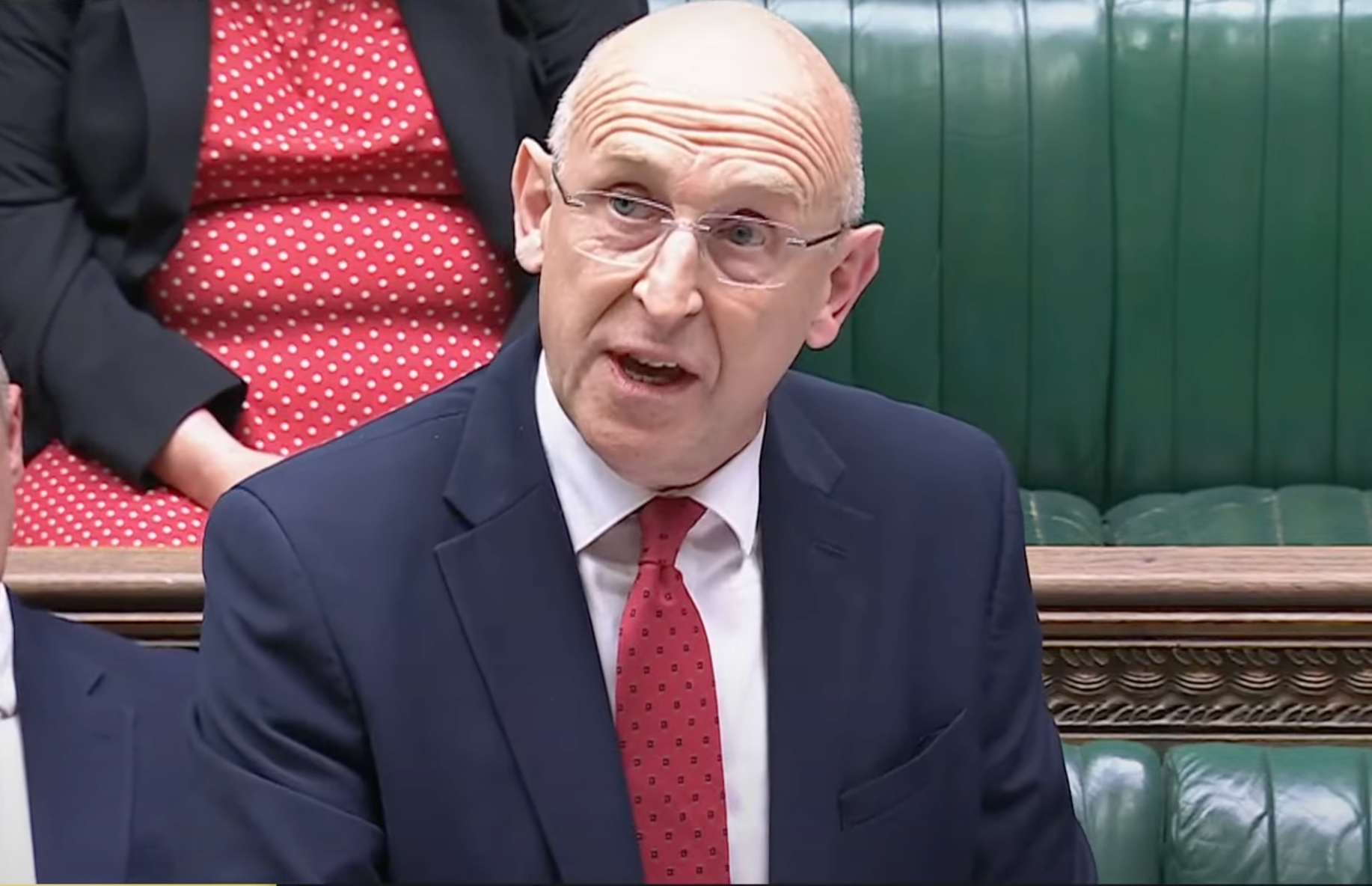
Defence secretary warns UK faces most serious threat since end of Cold War
17:11 , Tara CobhamThe defence secretary has warned the UK faces the most serious threat since the end of the Cold War.
John Healey told the Commons: “The threat we face is now more serious and less predictable than at any time since the end of the Cold War.”
Government accepts review's 63 recommendations
17:08The government accepts the new strategic defence review’s 63 recommendations, the defence secretary has confirmed.
Defence secretary begins statement in Commons
17:06 , Tara CobhamJohn Healey has begun to give his statement on the new strategic defence review to the Commons.
Defence minister responds to urgent question on future of UK's nuclear deterrent
16:57 , Tara CobhamA defence minister has responded to an urgent question on the future of the UK’s nuclear deterrent.
Luke Pollard told the Commons: “When it comes to the continuous at sea nuclear deterrent, the backbone of our national security, we retain full operational control of our independent nuclear deterrent.
“Certainly it’s the first duty of any government to keep our country safe and the nuclear deterrent is our ultimate guarantor of our national security and safety, and I can confirm that only the prime minister has the power to launch nuclear actions in this respect.”
Mr Pollard earlier acknowledged the UK “continues to have conversations with the United States” on security matters, but declined to provide detail.
The urgent question was tabled after The Sunday Times reported that Britain wants to purchase fighter jets capable of firing tactical nuclear weapons.
Government to reveal full strategic defence review in few minutes
16:54The government will soon reveal the full strategic defence review.
It will come after the defence secretary John Healey gives a statement in the House of Commons at around 5pm.
The government has already disclosed some details of the review, but in a few minutes the full report will be unveiled.
Listen: Starmer refuses to rule out war with Russia
16:50 , Tara CobhamHow many nuclear submarines does the UK have – and are they ready for war?
16:30 , Tara CobhamBritain will build up to 12 new nuclear-powered submarines, Sir Keir Starmer will announce as he unveils his much-anticipated defence review.
In a bid to “ensure the UK rises to the challenge” of growing global security threats, the prime minister will say that the 130-page review is a “radical blueprint” signalling a “wave of investments” into military infrastructure and weaponry.
An extra £15bn will be spent on new nuclear warheads for the UK’s nuclear deterrent.
The plans will significantly increase the UK’s conventionally armed, nuclear-powered submarine fleet, with the new vessels built under a joint deal with the US and Australia, known as the Aukus partnership.
Here’s all you need to know about the UK’s fleet of nuclear-deterrent submarines, and the proposed plans for its future:

How many nuclear submarines does the UK have – and are they ready for war?
Commons speaker accuses government of showing 'complete disregard' to parliament
16:15 , Tara CobhamCommons speaker Sir Lindsay Hoyle has accused the government of showing “complete disregard” to parliament by revealing details of the new strategic defence review to the media first.
Making a statement in the Commons, Sir Lindsay said he regarded this to be a “blatant breach” of the ministerial code, which states that the most important announcements of government policy should be made in the first instance in parliament when it is in session.
Sir Lindsay noted it is for Prime Minister Sir Keir Starmer to enforce the ministerial code before adding he has asked the Public Administration and Constitutional Affairs Committee to consider making enquiries into the matter.
He told the Commons: “I am here to defend the backbenches, so please, I hope we have no more of this. It is the government’s ministerial code, they should be ashamed they’re not enforcing it.”
Economic think tank: Defence overhaul won’t necessarily boost growth
16:06 , Athena StavrouThe Independent’s Political Correspondent Archie Mitchell reports:
The Institute for Fiscal Studies (IFS) has warned that Sir Keir Starmer’s defence overhaul is not the most direct way to boost growth in the UK.
After the prime minister claimed Britons would see a “defence dividend” in greater jobs and economic growth spurred on by the plans, IFS director Paul Johnson said the idea is “silly”.
He told Times Radio: “Is spending this money on defence specifically the best way of achieving growth? No, of course it's not.
“The idea that this is all about growth is silly. Clearly we would be better off in a world in which we didn't have to invest a part of money in defence.
“So the idea that this is better than not doing it from the growth point of view, I think is just wrong.”

I’m a former submariner – here’s what you need to know about Britain’s new nuclear fleet
15:47 , Athena StavrouDuring the Cold War and for a short time following the collapse of the Soviet Empire, the United Kingdom had a fleet of submarines: the Strategic Deterrent, the Hunter Killer Fleet boats and the Diesel Submarine Flotillas.
Yet post Cold War, political decisions were made on the assumption that we no longer needed such capable forces; the peace had been won.
As the prime minister announces plans for 12 new nuclear-powered submarines, former submariner David Bessell warns the news comes a decade too late.
Read the full comment here:
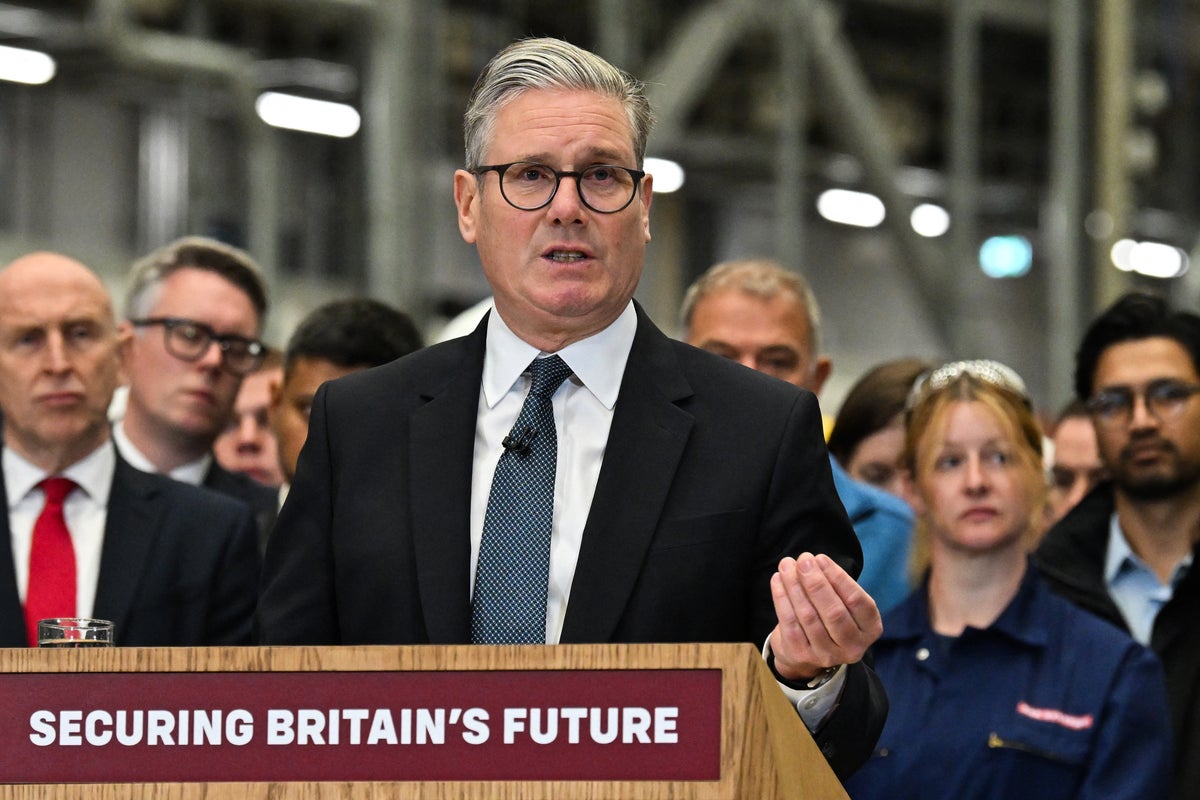
Here’s what you need to know about Britain’s new nuclear fleet
Recap: What are the details of the PM's new defence plans?
15:41 , Athena StavrouOn Monday, the government’s strategic defence review was launched.
It concluded that the UK should be ready for war in Europe or the Atlantic - prompting Sir Keir Starmer to pledge further defence measures.
In his speech on Monday morning, he said these would include:
• Six new munition factories
• Up to 12 new nuclear attack submarines.
• £15bn of investment in the nuclear warhead programme.
• Buying up to 7,000 UK-built long-range weapons.
• More than £1.5 billion of additional funding to repair and renew armed forces housing.
• Boosting weapons and equipment stockpiles and making sure there is capacity to scale up production if needed in a crisis or war.

That’s fighting talk, prime minister – but can you deliver?
15:16 , Athena StavrouEven if the Kremlin wasn’t shell-shocked by Sunday’s devastating drone attack on military targets across Russia by Ukraine’s intelligence service, would today’s UK Strategic Defence Review be awaited with bated breath in Moscow?
In the face of Russian aggression, Keir Starmer says he must ready the country for war, by increasing military spending and building a platoon of nuclear submarines.
But, as Mark Almond cautions, perhaps the only thing the Ministry of Defence can be guaranteed to produce on time are defence reviews.
Read the full comment piece here:

Growing anger among MPs over lack of briefing
15:04 , Athena StavrouThe Independent’s Political Editor David Maddox reports:
Just two hours before the strategic defence review is set to be presented to parliament many MPs are complaining that they have still not seen a copy.
While lock in briefings were available for journalists most MPs, including opposition shadow defence ministers, are still in the dark, The Independent has been told.
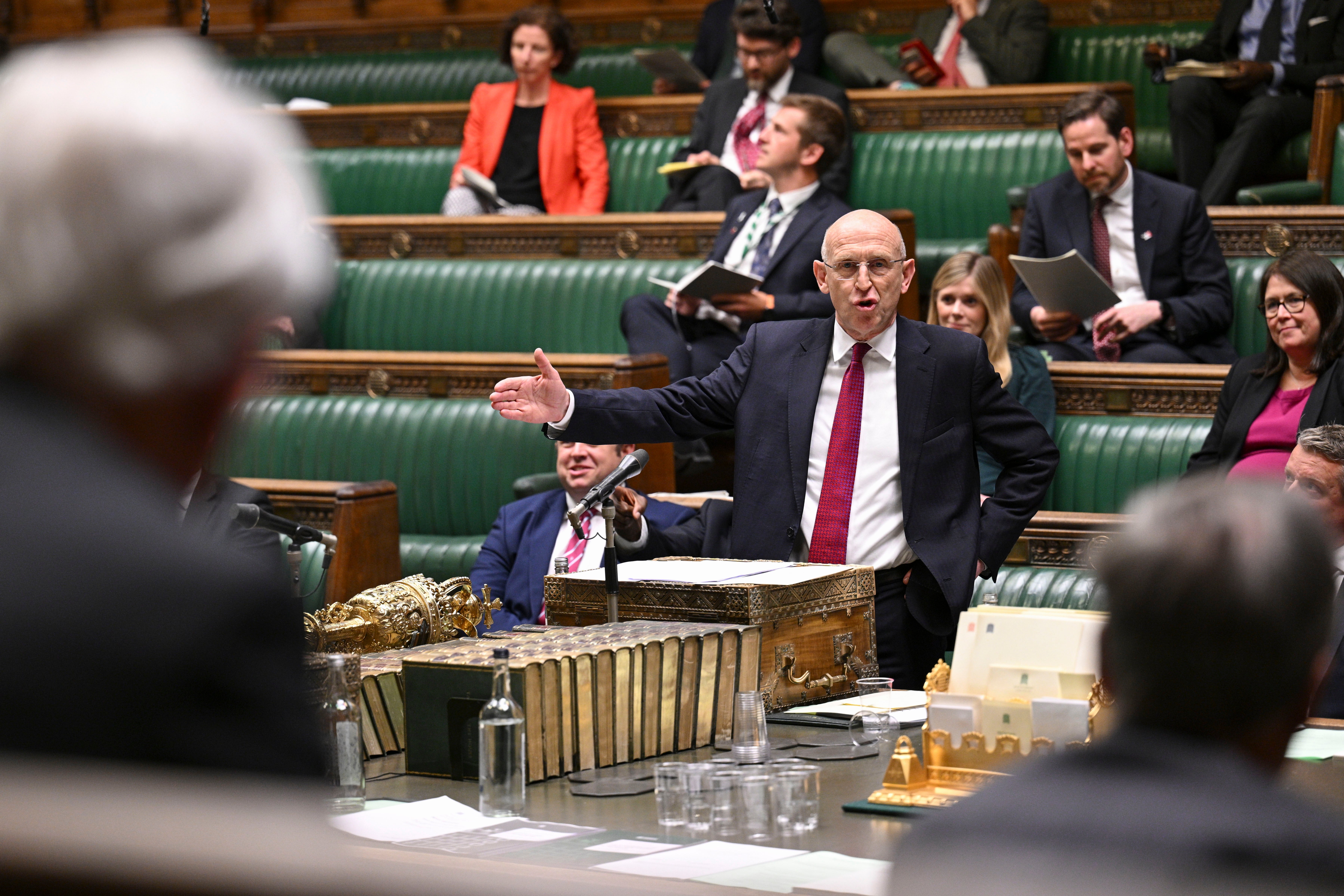
As previously reported Speaker Sir Lindsay Hoyle has been described as "fuming" over leaks to Sunday newspapers.
It means the government's big moment has been delayed by not one but two urgent questions.
'Starmer on a warpath': Green Party
14:55 , Athena StavrouThe Green Party has criticised Starmer’s new defence plans, arguing that the government should strive to “look at the deeper causes of insecurity” around the world.
“Keir Starmer is sounding like he is on a war path with his "battle-ready, armour-clad nation" rhetoric,” Ellie Chowns MP, who holds the defence brief for the Parliamentary Green Party, said.
“Security is not just based on arms expenditure and threats, but on real leadership that uses diplomacy and development too. There must be a real commitment to an international order based on human rights, equality and genuine cooperation.
“To avoid the horrors of war and armed conflict, we need to look at the deeper causes of insecurity, including poverty and climate breakdown.”

She added that the Green Party’s position is to support “the restoration of the international aid budget to at least 0.7 per cent of Gross National Income (GNI)”.
She added: “We will continue to argue that real patriotism means ending UK-made weapons or components being sold to dictators, human rights abusers or for use against civilians anywhere in the world.”
Will Starmer have to raise taxes to pay for defence?
14:44 , Athena StavrouThe Independent’s Political Editor David Maddox reports:
Paul Johnson, director of the Institute for Fiscal Studies (IFS), believes that the unspoken truth about the commitment to 3 per cent of GDP on defence is it can only be funded with tax rises.
Speaking to Times Radio this morning, he said: “It looks like the government wants to reinstate the winter fuel payment. It's thinking about the two-child limit for benefits.
“We've got a spending review next week. And if we're really going to spend another £10-15 billion a year on defence, whilst inevitably we're going to spend more and more on health and pensions and so on, you really do have to ask that question, what are the choices that you're going to make?
“And I mean, bluntly, it really does seem to me that the only choice that is available, if we're going to go through all of those things, is some really quite chunky tax increases to pay for it.
“But of course, that's not something the prime minister or the chancellor is willing actually to say."
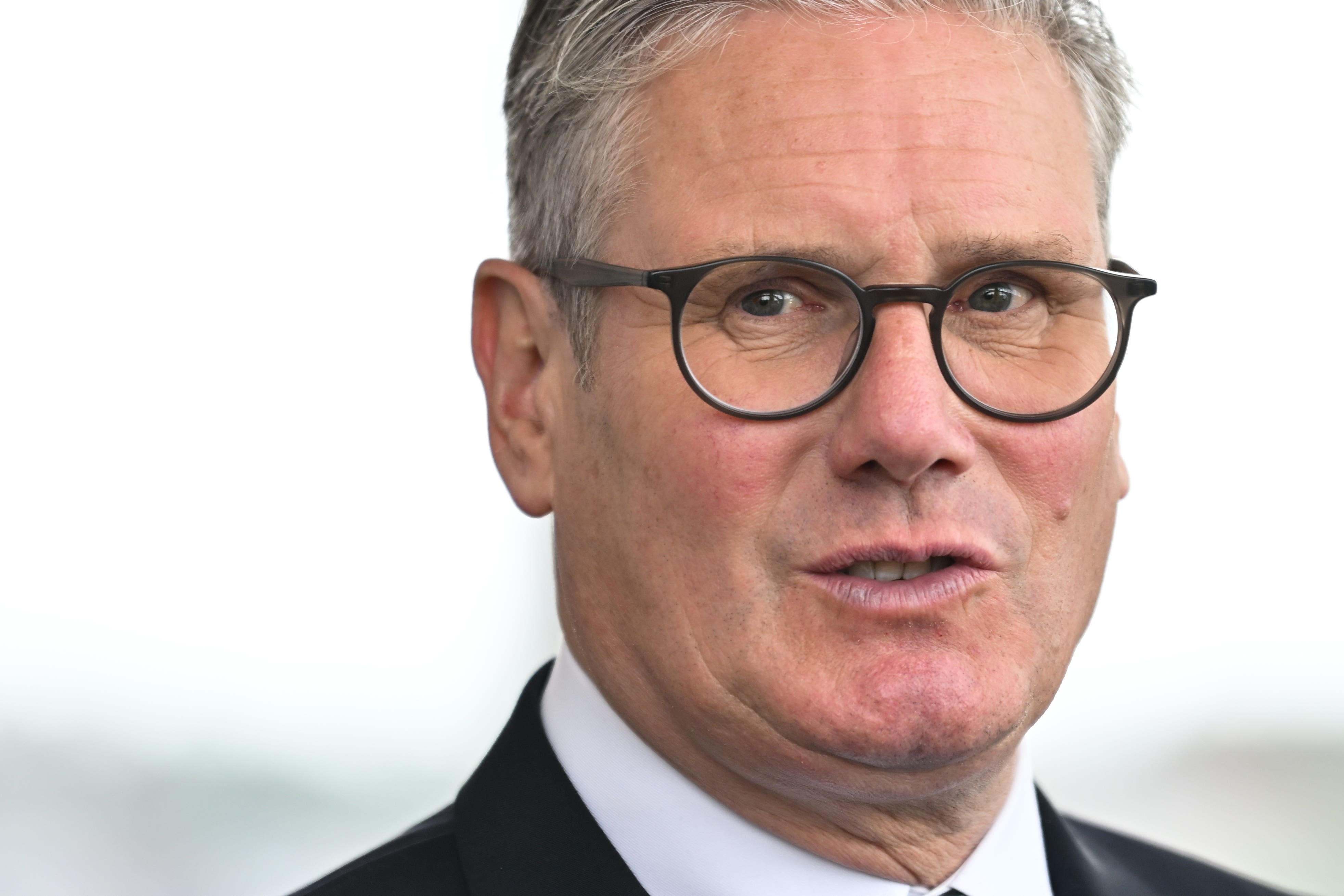
Chunky tax hikes will be needed to fund defence, warns IFS
14:31 , Athena StavrouThe Independent’s Political Correspondent Archie Mitchell reports:
The Institute for Fiscal Studies (IFS) has warned that “quite chunky” tax hikes will be needed to fund Sir Keir Starmer’s planned uplift in defence spending.
Paul Johnson, director of the economic think tank, told Times Radio: “It looks like the government wants to reinstate the winter fuel payment. It's thinking about the two-child limit for benefits.
“We've got a spending review next week. And if we're really going to spend another £10-15 billion a year on defence, whilst inevitably we're going to spend more and more on health and pensions and so on, you really do have to ask that question, what are the choices that you're going to make?
“And I mean, bluntly, it really does seem to me that the only choice that is available, if we're going to go through all of those things, is some really quite chunky tax increases to pay for it.
“But of course, that's not something the prime minister or the chancellor is willing actually to say."
Still to come today
14:14 , Athena StavrouAfter Sir Keir Starmer launched the government’s new strategic defence measures, ministers will face more questions from fellow MPs.
At around 4:15pm, there will be urgent questions in the Commons on the future of the UK’s nuclear deterrent.
This will be followed by a statement delivered by Defence Secretary John Healey.
We will bring you the latest updates here.
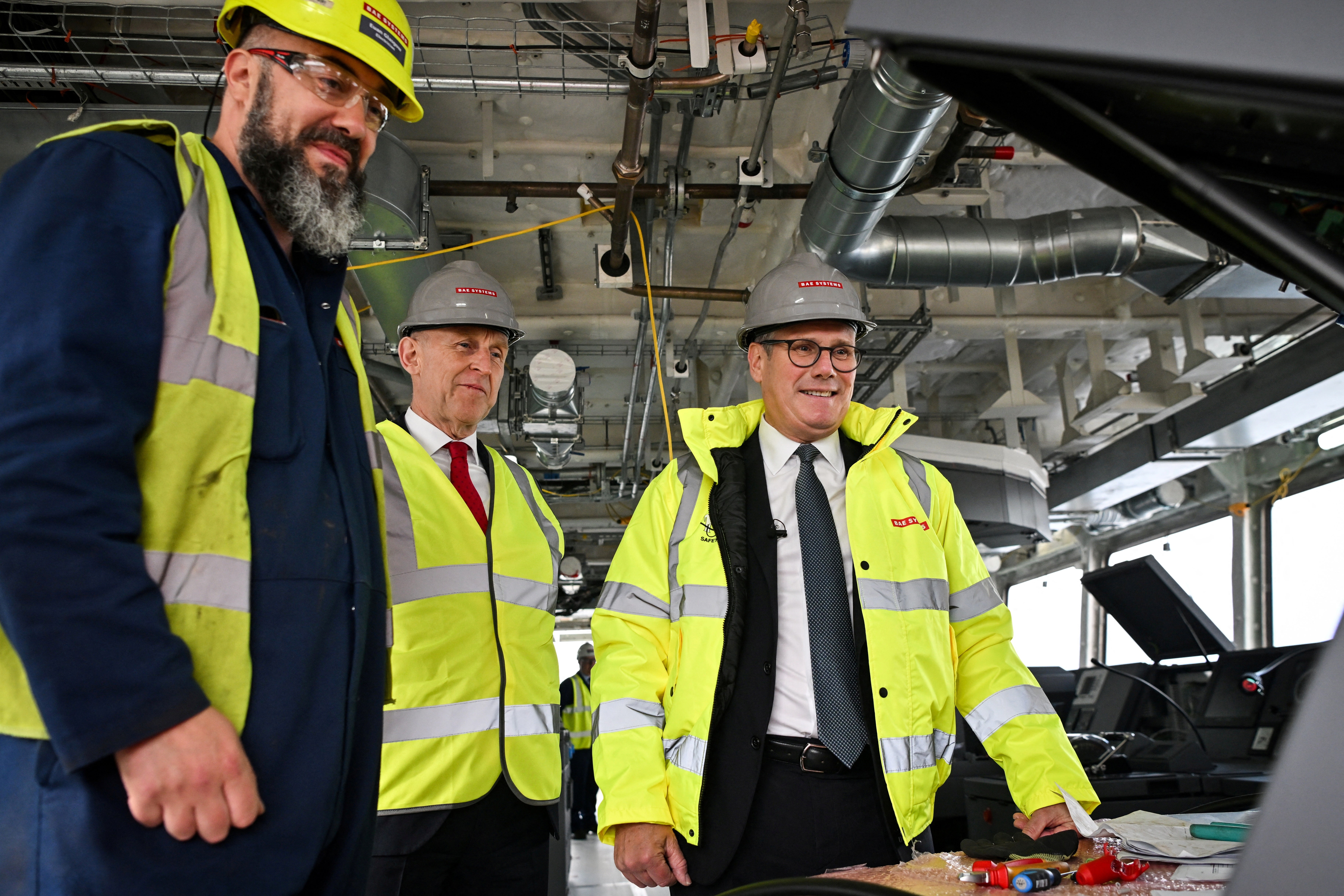
Speaker unhappy over pre briefing of defence plan
14:03 , Athena StavrouThe Independent’s Political Editor David Maddox reports:
It appears Sir Lindsay Hoyle is annoyed at the government "leaking" it strategic defence review before announcing it to parliament.
The Speaker is quite a stickler for this and has clashed with ministers before.
This time he has granted an urgent question for 3.30pm regarding the SDR being leaked and announced outside the House of Commons.
This of course in itself will delay the SDR being presented to parliament.

PM's refusal to rule out fresh aid cuts 'disappointing'
13:42 , Athena StavrouThe Independent’s Political Correspondent Archie Mitchell reports:
Sir Keir Starmer's refusal to rule out fresh cuts to the international aid budget are "disappointing", a network for organisations working in international development and humanitarian assistance has said.
Bond reacted to the PM leaving further aid cuts on the table with a warning that development spending and money for defence are "part of the same triangle".
Policy and advocacy director Gideon Rabinowitz said: "It is disappointing that the Prime Minister has failed to rule out further cuts to the UK aid budget to fund defence spending.
"Defence, diplomacy and development are not competing priorities, they are part of the same triangle. Slashing the development budget while boosting defence breaks this balance and puts long-term global security at risk.
“You don’t strengthen our national security by weakening the very tools that prevent global conflict, fight poverty, tackle hunger, and protect us against future pandemics."

How many submarines will the UK have in the future?
13:13 , Athena StavrouTwo further Astute-class submarines, HMS Agamemnon and HMS Agincourt, are set to enter service in late 2025 and late 2026 respectively.
Agamemnon is currently going through trials with the Royal Navy as part of a test and commissioning programme, while Agincourt remains under construction.
As part of the joint defence deal between the US, Australia and the UK - known as Aukus - the UK is set to significantly boost its fleet of submarines following the defence review.
An added 12 submarines would bring the UK’s fleet up to more than 20 in total. This remains far smaller than the US’s fleet of 71, and China and Russia’s fleets of 66 each.
Speaker unhappy over pre briefing of Starmer's defence plan
13:10 , David MaddoxIt appears Sir Lindsay Hoyle is annoyed at the government "leaking" it strategic defence review before announcing it to parliament.
The Speaker is quite a stickler for this and has clashed with ministers before. This time he has granted an urgent question for 3.30pm regarding the SDR being leaked and announced outside the House of Commons.
This, of course, in itself will delay the SDR being presented to parliament.
UK defence spending as share of GDP
13:01 , Athena Stavrou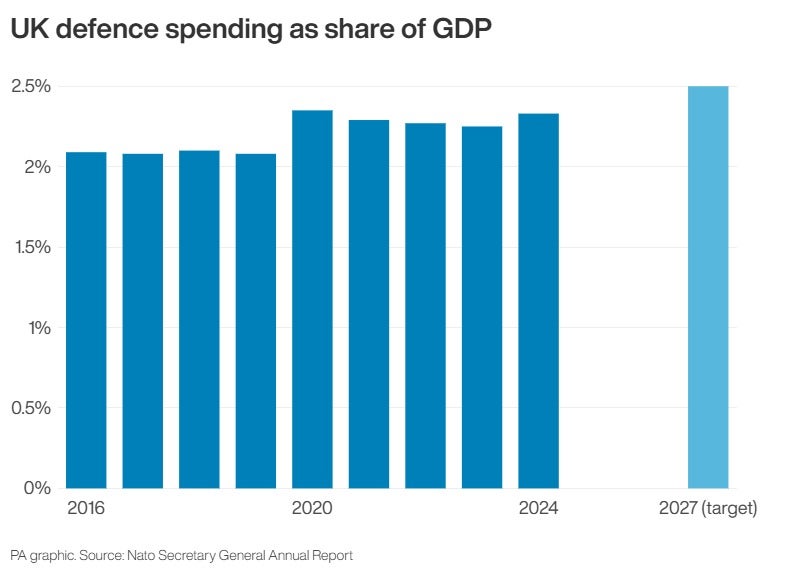
How many nuclear submarines does the UK have – and are they ready for war?
12:45 , Athena StavrouBritain will build up to 12 new nuclear-powered submarines, Sir Keir Starmer has announced.
The plans will significantly increase the UK’s conventionally armed, nuclear-powered submarine fleet, with the new vessels built under a joint deal with the US and Australia, known as the Aukus partnership.
Here’s all you need to know about the UK’s fleet of nuclear-deterrent submarines, and the proposed plans for its future:

How many nuclear submarines does the UK have – and are they ready for war?
Pictured: Starmer visits BAE Systems shipyard in Glasgow
12:29 , Athena Stavrou


Campaign groups slam Starmer's 'grotesque' defence review
12:22 , Athena StavrouCampaign group Stop the War have branded the government’s new defence plans as “simply grotesque”.
“Keir Starmer, John Healey and the Ministry of Defence have spent the days before the release of this spending review painting a picture of the most heightened military and security threat since the end of the cold war,” Stop the War vice chair Chris Nineham said.
“They say they want the UK to move to ‘war-fighting readiness’, but talking up a new era of threat while tying an ailing economy even more to military production only makes the threat of war more likely.”
He added: “The pledges in this review are even more grotesque given the eye-watering record profits being made by the arms manufacturers and their shareholders as a result of the endless conflicts which are only perpetuated by these levels of increased defence spending – paid for with our tax pounds and by slashing the welfare budget.”
Labour 'can't commit to properly funding' armed forces: Badenoch
12:11 , Athena StavrouKemi Badenoch has criticised the Labour government for failing to commit to further defence spending increases.
Sir Keir Starmer has refused to set a date to reach 3 per cent of GDP on defence spending, instead calling it an “ambition”.
The Conservative Party leader said: “Labour can’t even hold a defence policy together for 48 hours — how can they be trusted to defend Britain?
“In the most dangerous era in a generation, they found BILLIONS for the Chagos surrender — but can’t commit to properly funding our Armed Forces.
“Scrap Chagos. Fund defence.”

Watch: Starmer confirms plans for new defence measures
11:55Starmer outlines three goals to UK defence strategy
11:44 , Athena StavrouDuring his speech announcing new defence measures, Sir Keir Starmer outlines three key aims.
They were as follows:
1. To move the UK into “war-fighting readiness” as the most effective way to deter threats.
2. The government will adopt a Nato-first stance towards defence to add strength the alliance.
3. The UK will “innovate and accelerate innovation at a wartime pace".

What are the details of the PM's new defence plans?
11:30 , Athena StavrouOn Monday, the government’s strategic defence review was launched.
It concluded that the UK should be ready for war in Europe or the Atlantic - prompting Sir Keir Starmer to pledge further defence measures.
In his speech on Monday morning, he said these would include:
• Six new munition factories
• Up to 12 new nuclear attack submarines.
• £15bn of investment in the nuclear warhead programme.
• Buying up to 7,000 UK-built long-range weapons.
• More than £1.5 billion of additional funding to repair and renew armed forces housing.
• Boosting weapons and equipment stockpiles and making sure there is capacity to scale up production if needed in a crisis or war.
Analysis: Was the defence secretary slapped down by the Treasury on spending?
11:09By Kate Devlin, Whitehall Editor:
How much is the government planning to spend on defence?
On Saturday it appeared clear. The defence secretary John Healey said in an interview with the Times that he had “no doubt” it would by 2034.
By Sunday that had become an ambition.Spending is, of course, controlled by the Treasury and the chancellor Rachel Reeves.
So what we are left with is only a firm commitment to raise spending to 2.5 per cent in the next two years.
Pictured: Starmer unveils new defence measures from Glasgow
11:00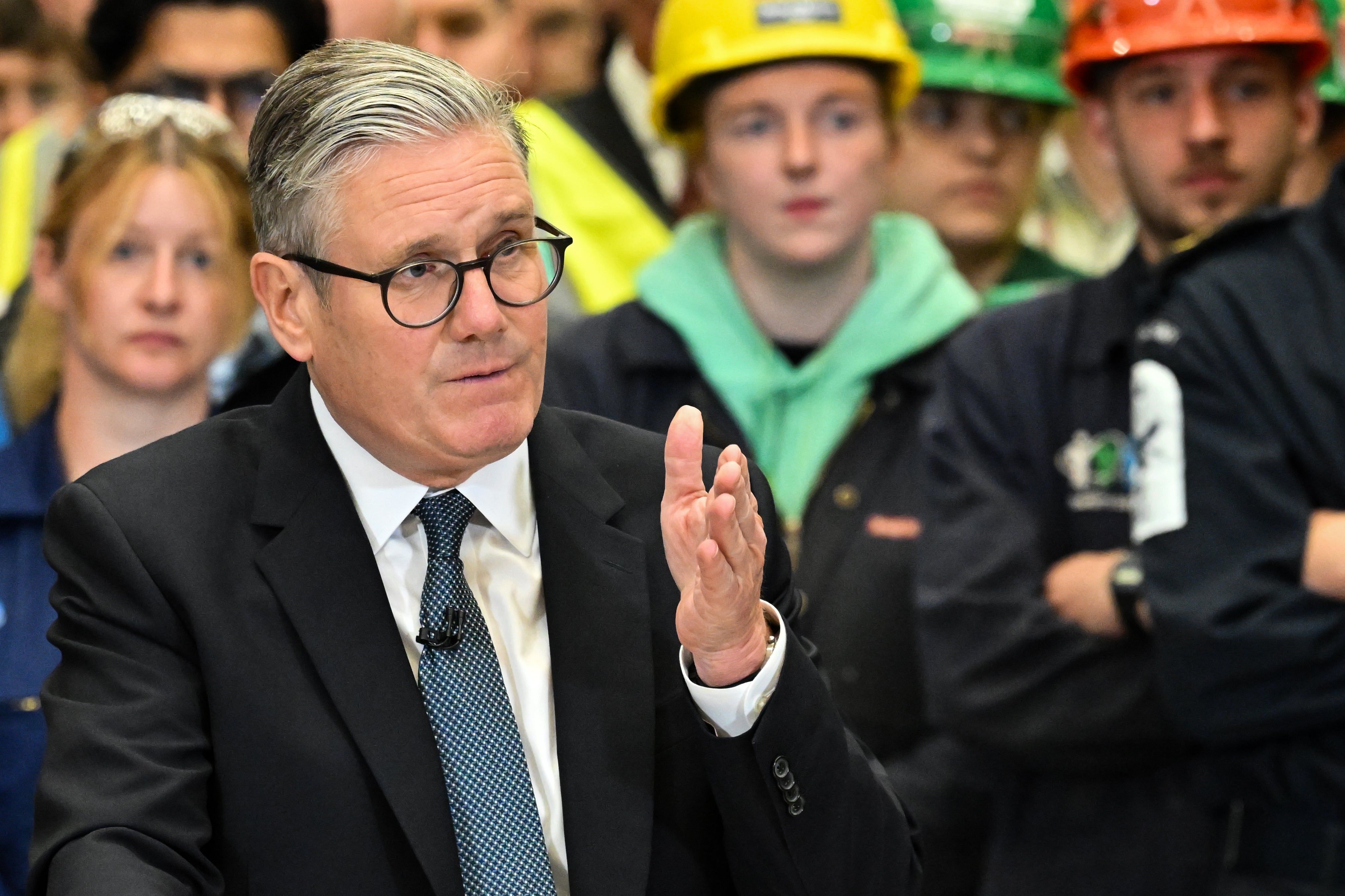
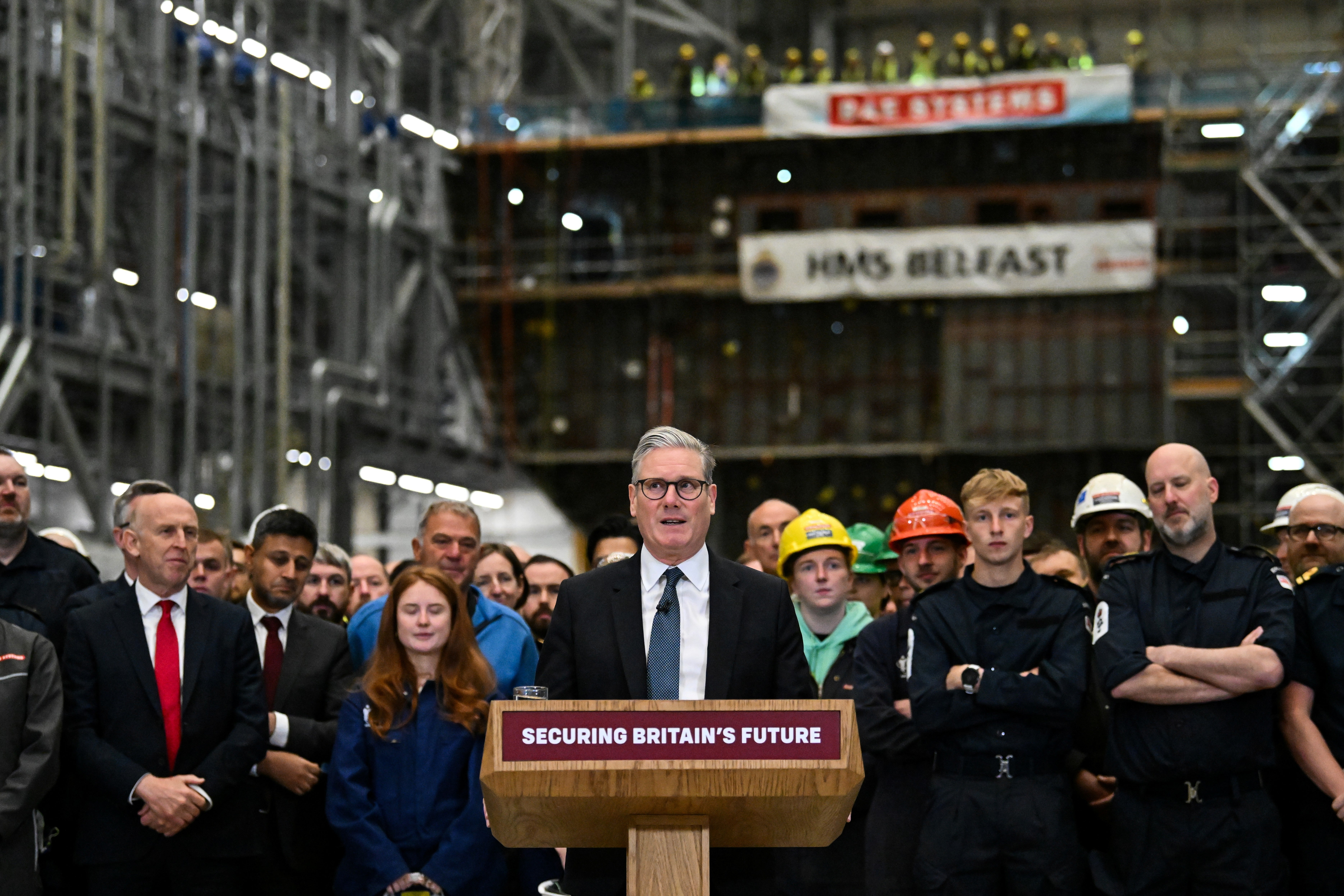

Analysis: What will the strategic defence review miss?
10:51 , Athena StavrouBy Kate Devlin, Whitehall Editor
Keir Starmer’s highly-anticipated defence review will rightly concentrate much on Russia
.The 130 page document is expected to try to learn the lessons from the brutal war in Ukraine.And the defence secretary John Healey has already described it as a “message to Moscow”.
But what will it miss?
The point of these reviews, done every so often by governments, is to try to see around corners and anticipate future global defence risks.
But the last review, while Boris Johnson was PM, failed to foresee the invasion of Ukraine just a year or so later.
What could we be talking about in just 12 months time that Starmer’s defence review does not forecast?
Starmer moving UK to 'war-fighting readiness'
10:44 , Athena StavrouSir Keir Starmer has outlined his fundamental defence goals as he unveiled new measures.
The main one was to moce the UK to “war-fighting readiness” as the “"most effective way" to deter aggressors.
Speaking in Glasgow, Sir Keir said: “First, we are moving to war-fighting readiness as the central purpose of our armed forces.
“When we are being directly threatened by states with advanced military forces, the most effective way to deter them is to be ready, and frankly, to show them that we’re ready to deliver peace through strength.”
The second change is that the Government will adopt a “Nato-first” stance towards defence so that everything it does adds to the strength of the alliance.
Sir Keir added: “Third, we will innovate and accelerate innovation at a wartime pace, so we can meet the threats of today and of tomorrow, as the fastest innovator in Nato.”
Crucial by-election hangs over Starmer making his announcement in Scotland today
10:40 , Athena StavrouThe Independent’s Political Editor David Maddox reports:
BBC Scotland has just reminded Sir Keir Starmer of a Scottish Parliament election just south of where he is making his strategic defence review announcement in Govan.
The by-election in Hamilton is now becoming a touchstone for Labour’s spending plans in Westminster.
The issue is that while defence spending is important, welfare and winter fuel payment cuts are what is coming up on the doorstep.
The pressures perhaps underline why Sir Keir cannot fully commit to 3 per cent of GDP on defence.It is noticeable that while he is not going to support the Labour candidate in Hamilton, Nigel Farage will be going there today to support the Reform candidate.
When Farage feels more welcome than a Labour leader in Scotland, then things are really turning. The Reform leader was once chased out of Scotland during its referendum in 2013.
The SNP are favourites to win in Hamilton but Labour are no longer second favourite that position is currently held by Reform.
Starmer won’t rule out further aid cuts to fund defence
10:35The Independent’s Political Correspondent Archie Mitchell reports:
Sir Keir Starmer has refused to rule out further cuts to the international aid budget to fund increases in defence spending.
The prime minister said slashing defence spending to hike up defence spending was a “difficult choice” and Britain is still “working with other countries” on how much aid they need.
“But the best way to pay for any increase in public spending is to grow our economy,” he added.
He was asked whether he could rule out further cuts to aid spending, but did not do so.
Situation in Gaza 'getting worse by the day' - Starmer
10:33 , Athena StavrouSir Keir Starmer has said the situation in Gaza is “intolerable” and “is getting worse by the day”.
When asked whether the government was doing enough to help the situation he said: “In relation to Gaza, the situation is intolerable in Gaza and is getting worse by the day.
“Which is why we are working with allies. In saying it’s intolerable it is absolutely clear that there needs to be a ceasefire.
“It is absolutely clear that humanitarian aid needs to get it at speed and at volumes that it is not getting in at the moment. It’s causing absolute devastation.”
Armed forces overhaul will lead to ‘defence dividend’
10:28 , Athena StavrouThe Independent’s Political Correspondent Archie Mitchell reports:
Sir Keir Starmer has said that nations enjoyed a “peace dividend” after the Cold War as they were able to cut defence spending and invest in public services.
The prime minister said that “faced with new circumstances today”, the UK must invest in its armed forces and the public will see a “defence dividend” due to the spending.
He said ramping up spending on defence will drive jobs and investment, create opportunities for skilled work and boost community pride.
“Everyone across the United Kingdom has a role to play in this effort, but also everyone has a stake in its success,” the PM said.

Starmer taking questions
10:26 , Athena StavrouThe prime minister is now taking questions from members of the media.
When asked if he could “unequivocally” deliver the new defence measures, he said he was “100 per cent confident” on the plans.
Starmer confirms plans for new defence measures
10:24 , Athena StavrouSir Keir Starmer confirmed plans for new defence measures during his speech on Monday.
The prime minister confirmed the government will commission 12 new attack submarines - with one to be delivered every 18 months.
‘UK learning the lessons of Ukraine,’ PM says
10:22 , Athena StavrouThe Independent’s Political Correspondent Archie Mitchell reports:
Sir Keir Starmer has said the UK is learning the lessons of Ukraine and will deliver an army 10 times more lethal than it is now by 2035.
The prime minister said he has spoken repeatedly to Ukrainian president Volodymyr Zelensky about ensuring all aspects of Britain’s military “work seamlessly together”.
“To ensure that drones, destroyers, AI, aircraft, and each different branch of our armed services are fully integrated,” he said.
3% defence spend target 'Subject to economic and fiscal conditions' - Starmer
10:19 , Athena StavrouSir Keir Starmer has again refused to make a firm commitment to raising defence spending to 3 per cent of GDP.
Speaking in Glasgow as he unveiled new defence plans, he said: “We have already acted, announcing the largest sustained increase in defence spending since the end of the cold war. Raising it to 2.5 per cent of defence spending by 2027.
“Setting the ambition to hit 3 percent in the next parliament. Subject to economic and fiscal conditions.”
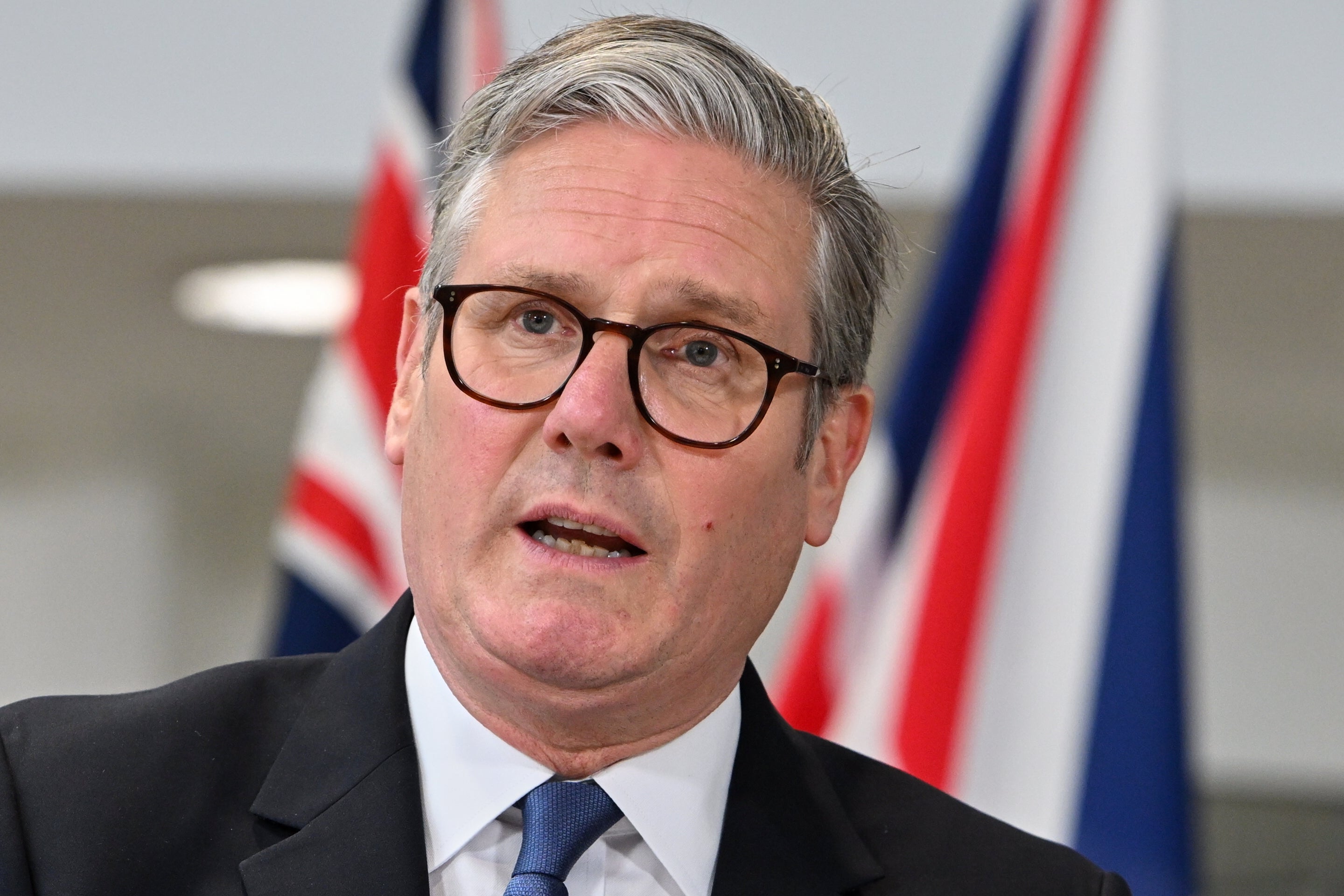
‘Nothing works unless we all work together,’ Starmer
10:14 , Athena StavrouThe Independent’s Political Correspondent Archie Mitchell reports:
Sir Keir Starmer has said he learned on a visit to a nuclear submarine that their motto is “nothing works unless we all work together”.
Unveiling his strategic defence review, he said the motto now applies to the whole country.
Sir Keir said: “The strategic defence review that I'm launching today will bring that unity to the whole of the United Kingdom, to mobilise the nation in a common cause, recognising in these dangerous times that when it comes to defence of the realm and the defence of everything that we hold dear, nothing works unless we all work together.”
He added: “Every citizen of this country has a role to play.”
Starmer fails to firmly commit to 3% defence spending boost
09:49 , Athena StavrouThe government has to faced tough questions on its lack of promises on raising defence spending.
Sir Keir Starmer has said he has an “ambition” to raise defence spending up to 3 per cent of GDP in the next parliament.
However, he has stopped short of making a firm commitment to achieve the goal.
The Prime Minister told BBC Radio 4’s Today programme: “We had a commitment for 2.5 per cent by the end of this Parliament. We pulled that right forward to 2027.
“We showed that when we say there’s a new era of the defence and security of our country, is our first priority – as it is – that we meant it. We take the same approach to 3 per cent.
“But I’m not going to indulge in the fantasy politics of simply plucking dates from the air until I’m absolutely clear that I can sit here in an interview with you and tell you exactly how that’s going to work, because I take the defence and security of our country extremely seriously.”
The Government has pledged to raise the UK’s defence spending to 2.5 per cent of GDP – a measure of the country’s economic output – by 2027.
But on Sunday, Defence Secretary John Healey sidestepped questions about whether he had any guarantee from the Treasury to provide the funding for the 3 per cent target by the end of the next Parliament, when asked on the BBC’s Sunday with Laura Kuenssberg programme.
UK must be ready to fight in Europe or Atlantic, review says
07:53 , Athena StavrouThe government’s long-awaited defence review has warned that Britain should move to “warfighting readiness” in Europe or the Atlantic.
The review concludes: “A landmark shift in our deterrence and defence: moving to warfighting readiness to deter threats and strengthen security in the Euro Atlantic area.”
Sir Keir Starmer has promised to build up to 12 new nuclear-powered attack submarines and invest £15 billion in its warhead programme, in response to the report.
